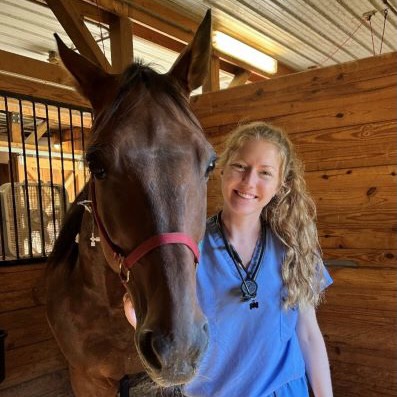Peyton, Class of 2024
When did you decide to pursue veterinary medicine?
As the daughter of a veterinarian, I grew up in the animal hospital, and always knew I wanted to pursue veterinary medicine. From the day I could walk, I was following my mom around at work playing with the kittens and puppies. She would come home with stories about her cases and pictures of radiographs and lesions for me to practice identifying. As soon as I was able to, I got a job working with her and began to immerse myself into the veterinary world. In addition to working as a small animal general practitioner, my mom is also the vet for a local zoo of non-releasable wildlife. From as early as I could remember, she was caring for the wildlife in our home, allowing me to help with feeding and animal care before they could be returned to the zoo in good health.
What did you do to prepare for veterinary school?
In addition to working in the animal hospital with my mom, I attended an undergraduate institution that required externships. I completed one small animal externship in a corporate owned practice, two large animal externship with an ambulatory clinician and equine acupuncturist, and one equine externship working with the veterinary care staff at a therapeutic horseback riding farm. I wrote my senior thesis on Evaluating the Effects of Human Handling Methods on Equine Stress Behaviors while working with the therapy horses. I worked as a zookeeping extern for a summer, helping to care for the non-releasable wildlife population in a local zoo, and spent another summer as a student researcher in oncology at Pfizer. Additionally, I played 4 years of collegiate softball and worked as a peer tutor and student note taker at my undergraduate institution.
What advice do you have for high school or college students who are interested in becoming a veterinarian?
My best advice would be to immerse yourself in as many aspects of veterinary medicine as possible. There are so many paths that a doctorate in veterinary medicine can take you that are outside traditional small animal general practice. I always thought I wanted to do small animal work like my mom before I explored the equine field. Now I am pursing a career as a large animal surgeon! By completing externships outside my comfort zone and working with many species, I allowed myself to make a more informed decision about the path I wanted to take in my veterinary career. I worked with dogs, cats, rodents, birds, coyotes, foxes, amphibians, reptiles, bears, research animals, and porcupines before I decided that horses were the animal for me!
What do you like most about Cornell and your experience as a student?
I love the hands-on learning experience and range of extracurriculars that Cornell offers to the students! There is a club for every species interest ranging from cats and fish to horses and cows. Additionally, there are non-animal clubs to fit student interests including a dance collective, board games, student government, business, and many more. I am the treasurer and class of 2024 representative on the SAVMA executive board, and I am also actively involved in the student chapter of the American Association of Equine Practitioners (AAEP) and the Veterinary Business Management Association (VBMA).
After the fall of first year, we are allowed to apply for a job working in the hospital section of our choice. These jobs allow for hands-on experience outside the classroom and application of the didactic material we learn in the classroom. As a large animal student, I have a job in the Equine and Farm Animal Hospital as a student technician. I am responsible for assisting with animal care, including administration of medications, handling of patients, catheter placement, and any other care the patients need. This job has reinforced my passion for medicine and given me experiences I would not get at an externship.



